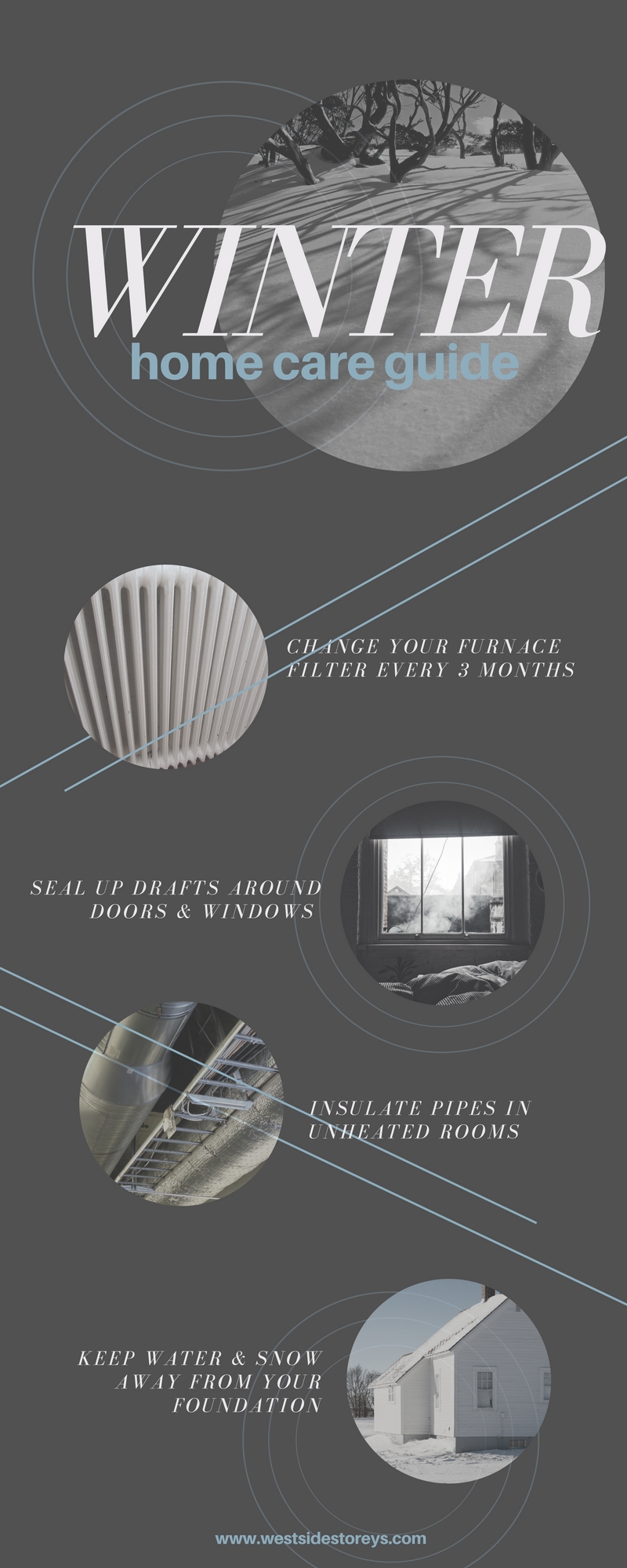That was a crazy week of cold weather in Toronto! Even though the temperature this week has been much warmer, this swing on the thermometer can wreak havoc on your home. Since it's a good reminder to all of us, we thought we'd share some of our tips on maintaining your house and keeping it comfortable during this time of year.
Winter Home Care
Caring for your furnace is important all year round but especially when it's working overtime. Many homes in our neighbourhood (although lovely!) lack good insulation so furnaces work very hard to keep up in cold temperatures.
Changing your furnace filter regularly helps with efficiency, output and overall air quality within your home. Most HVAC companies recommend changing filters every 3 months but we've found that in older homes after 60 days there can be quite a bit of build-up and filters are ready for a change. Setting a reminder on your smart-phone calendar helps to make sure you are not going too long without checking the filter. Another tip to maximize your furnaces efficiency is to turn down the thermostat at night and when you are away during the day. Only turn it down a few degrees (two or three). If the house gets too cold, it will only eat up any savings you gained when you have to reheat it.
Smart thermometers are great for this and there are several rebate programs available. We just ordered the ecobee (whoop! it's Canadian) and I'll let you know how we like it once it arrives.
Sealing up drafts around doors and windows is a good way to make sure you aren't losing that nice warm air you've worked so hard to get! Basic caulking around windows, adding threshold strips around doors and closing up kitchen and fireplace vents when not in use are all helpful in minimizing heat loss. Did you know they sell insulated mail slots? We had one at our last house and loved it.
Don't forget to play with solar gain and when the sun is out, open drapes and blinds to help warm your home. Close 'em as soon as the sun sets though; window = draft.
I heard personally from three people last weekend that they were dealing with frozen pipes. What can we do about it in an 100 year old home? Well, it's a bit of luck but some good preventive measures help too. As long as your house is heated and above freezing, pipes should continue to operate properly. However, check to see if tub and shower fixtures are installed against exterior walls; yep, they are in my house! Pay special attention to this with DIY reno work or work done without permits– sometimes what seems like the most convenient place to run pipe isn't the best in cold climates, hello frozen pipes!
The other areas of your house to pay attention to are any unheated zones (cold rooms, crawlspaces, attics, garages etc). If there are pipes in unheated areas ask an expert about the best ways to minimize your risk of frozen pipes. They may recommend wrapping insulation around pipes or supplemental heat in the areas during a deep freeze. If the house temperature drops below freezing due to long vacations, broken furnaces etc. issues can develop anywhere inside your home. This is why many plumbers recommend running a bit of water at every tap in this case. (It keeps the pipes from freezing since city water is roughly 10° C.)
We have only ever had water in our basement ONE TIME. And it was TERRIBLE. And it was because of thawing / re-freezing ice and snow that worked it's way in to our foundation. Oh, AND a broken downspout that was dumping loads of water right at the corner of our foundation that we didn't pay attention to. I am now so paranoid about making sure our downspouts are running freely during thaws and at least 6 feet away from our house. If ice gets lodged in the downspout, they don't work. If leaves haven't been properly cleaned out from gutters in the fall, they don't work. If your kid breaks off the downspout extension, they dump water in the wrong place, and don't work! Keep an eye on your downspouts all winter long to make sure they are running clear and are not frozen in a foot of snow.
Our tips for caring for your home in winter !
winter home care guide
Hope these tips help a bit. If I'm warm and not dealing with frozen pipes or water in my basement I'll be happy with this 100+ year old home this winter. It takes a bit of time to get to know the ins and outs of your home but when you do, it's much easier to keep on top of things. If this is your first winter in a new home take extra time to give it some TLC. You'll both be thankful.


